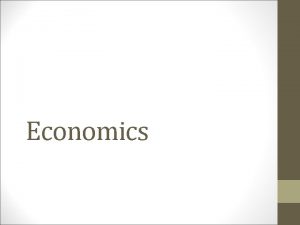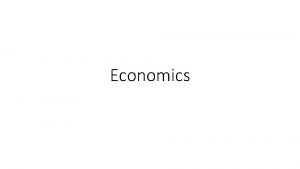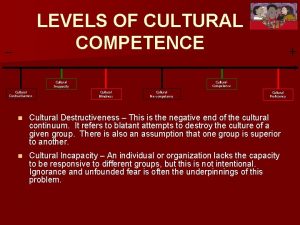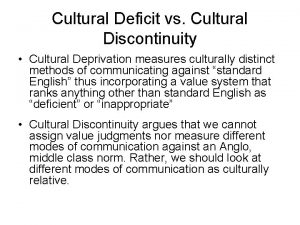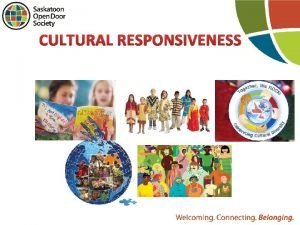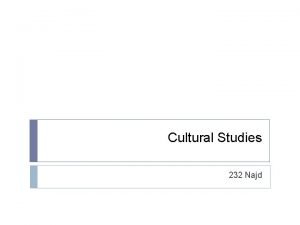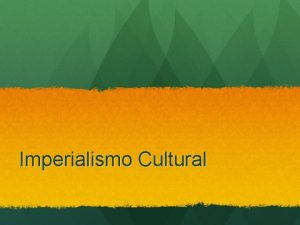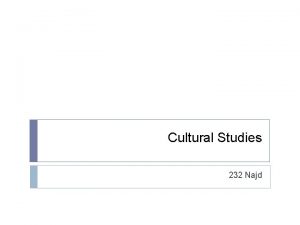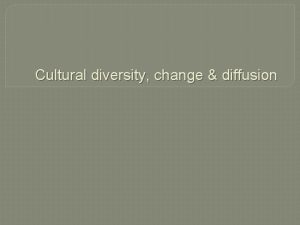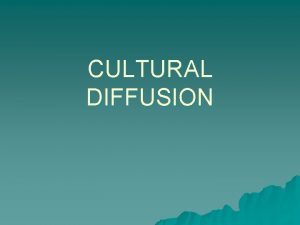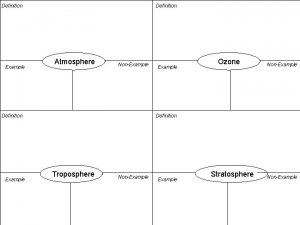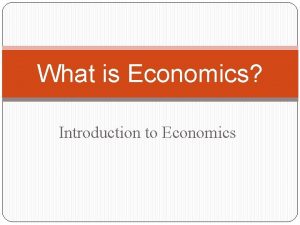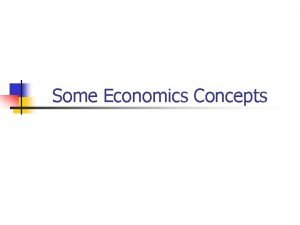CULTURAL ECONOMICS Definition l Cultural Economics is the









































- Slides: 41

CULTURAL ECONOMICS

Definition l Cultural Economics is the branch of ECONOMICS that studies the relation of CULTURE to economic outcomes. l Here, 'culture' is defined by shared beliefs and preferences of respective groups.

KEY ISSUES l. WHETHER and HOW MUCH culture matters as to economic outcomes

GLOBALIZATION

What is Globalization? Refers to the increased flow of trade, people, investment, technology, culture, ideas among countries and creates a more integrated and interdependent world w Globalization has been around since the 15 th century when European exploration & colonization created global empires & markets, but most historians and economists agree that today is special by the extent of interdependence and the speed by which it has occurred. w

Drivers of Globalization • Two factors underlie globalization ▫ “Decline in barriers to the free flow of goods, services, and capital” that has occurred since the end of World War II ▫ Technological change

ASPECTS OF GLOBALIZATION ECONOMIC 2. CULTURAL 3. POLITICAL THESE ASPECTS ARE ALL INTERCONNECTED! *********** 1.

Globalization of Production &. . . Services w Vizio flat panel TV is w designed in a small office in California w assembled in Mexico w From w w panels made in South Korea electronic components made in China microprocessors made in the U. S. Increasingly companies are using modern communications to outsource service activities to low-cost nations w Example: Customer Service calls routed to India

Globalization of markets w In the past, each country had its own companies in many industries and its own products w I saw little non-US media for most of my life w Now today everyone knows… w Nintendo w Starbucks w Coca-Cola w Ikea w Mc. Donald’s w Samsung

CULTURAL GLOBALIZATION Consumerism – People want more than they need Cultural lines have become blurred as world becomes more connected - (cultural imperialism) “Americanization” or “Mc. Donaldization” threatens local cultures • Hollywood movies • Disneyland • Starbucks • Dominance of the English language

Global Problems: terrorism The use of violence, or threatened use of violence, in order to achieve a political, religious, or ideological aim. • Globalization has contributed to terrorism. How? • Alienates & angers people who feel victimized by foreign influences that threaten native culture & practices • Creates economic frustrations as traditional skills become obsolete in the global market. •

Western Consumerism spreads Iran’s Islamic answer to Barbie and Ken: Sara and Dara

Differences in Culture


Differences in Culture Ø Ø Ø Societies’ differ along cultural dimensions What is culture? How/why do social structure, religion, language influence cultural differences? What are differences between culture and values in the workplace (corporate culture)? Culture changes over time. What are some reasons behind this? Implications for business managers


Cultural Appreciation Values Customs Aspects of culture Symbols Language

What is Culture? Ø Culture: a society’s (group’s) system of shared, learned values and norms; these are the society’s (group’s) design for living – Values: abstract ideas about the good, the right, the desirable – Norms: social rules and guidelines; guide appropriate behavior for specific situations § Folkways: norms of little moral significance dress code; table manners; timeliness § Mores: norms central to functioning of social life – bring serious retribution: thievery, adultery, alcohol

Basic U. S. Business Values

Cultural Diversity Ø Values represent personal or socially preferable modes of conduct or states of existence that are enduring. Why doesn’t Mc. Donald’s sell hamburgers in India?

Cultural Diversity Ø Customs are norms and expectations about the way people do things in a specific country.

What is Culture? “the collective programming of the mind which distinguishes the members of one human group over another… Culture, in this sense, includes systems of values; and values are among the building blocks of culture” Geert Hofstede

National Culture “Nation” is a useful: – Definition of society l similarity among people a cause -- and effect -- of national boundaries – Way to bound and measure culture for conduct of business l l culture is a key characteristic of societ can differ significantly across national borders – also within national borders l Ø laws are established along national lines Culture is both a cause and an effect of economic and political factors that vary across national borders

Individual vs Group Societal Characteristics Ø Individual – Managerial mobility between companies – Economic dynamism, innovation – Good general skills – Team work difficult, non-collaborative Ø Exposure to different ways of doing business – e. g. , U. S. companies Ø Group – Loyalty and commitment to – – – company In-depth knowledge of company Specialist skills Easy to build teams, collaboration Emotional identification with group or company e. g. , Japanese companies

Religion, Ethics and Culture Religion: system of shared beliefs about the sacred Ø Ethical systems: moral principles or values that shape and guide behavior; often products of religion Ø Major religious groups and some economic implications Ø – – – Christianity Islam Hinduism Buddhism Confucianism protestant work ethic Islamic economic principles anti-materialistic, socially stratified anti-materialistic, social equality hierarchy, loyalty, honesty

Language: Culture Bound ØLanguage, spoken – “private” does not exist as a word in many languages – Eskimos: 24 words for snow – Words which describe moral concepts can be unique to countries or areas – Spoken language precision important in lowcontext cultures ØLanguage, unspoken – Context. . . more important than spoken word in high context cultures

Non-Verbal Gestures

Non-Verbal Gestures

Non-Verbal Gestures

Non-Verbal Gestures

Cultural Diversity – “Chevy Nova Award” Ø Dairy Association’s huge success with the campaign “Got Milk? ” prompted them to expand advertising to Mexico Ø It was brought to their attention the Spanish translation read, “Are you lactating? ”

Cultural Diversity – “Chevy Nova Award” Ø Clairol introduced the “Mist Stick”, a curling iron into Germany Ø Only to find out that “mist” is German slang for manure.

Cultural Diversity Chevy Nova Award When Gerber started selling baby food in Africa, they used US packaging with the smiling baby on the label. In Africa, companies routinely put pictures on labels of what’s inside, since many people can’t read.

Cultural Diversity Chevy Nova Award Pepsi’s “Come Alive With the Pepsi Generation” in Chinese translated into “Pepsi Brings Your Ancestors Back From the Grave”

Cultural Stereotypes Cultural stereotypes: values and behaviors considered typical of a culture Are they valuable? Yes, if they reduce uncertainty about what expatriate can expect. No, if used to label an individual unlike the stereotype

Education and Culture Ø Education – Medium through which people are acculturated – Language, “myths, ” values, norms taught – Teaches personal achievement and competition – Critical to national competitive advantage Ø Education system may be a cultural outcome

Individualism Vs. Collectivism Ø Degree to which people in a country prefer to act as individuals rather than in groups Ø Describes the relations between the individual and his/her fellows

Masculinity Vs. Femininity Ø Division of roles and values in a society Ø Masculine values prevail: – assertiveness, success, competition Ø Feminine values prevail: – quality of life, maintenance of warm personal relationships, service, care for the weak, solidarity

Confucian Dynamism (Hofstede) Ø Attitudes towards – Time – Persistence – Status in society – “Face” – Respect for tradition – Gifts and favors

Cultural Change Over Time ØChange is slow and often painful ØShifts away from “traditional values” towards “secular values” ØChanges with shift from “survival values” to “selfexpression values”

Managerial Implications Ø Ethnocentrism vs Polycentrism Ø Must a company adapt to local cultures or can corporate -- often home-country dominated -- culture prevail? Ø Cross-cultural literacy essential Ø Do some cultures offer a national competitive advantage over others?
 Hát kết hợp bộ gõ cơ thể
Hát kết hợp bộ gõ cơ thể Slidetodoc
Slidetodoc Bổ thể
Bổ thể Tỉ lệ cơ thể trẻ em
Tỉ lệ cơ thể trẻ em Chó sói
Chó sói Glasgow thang điểm
Glasgow thang điểm Alleluia hat len nguoi oi
Alleluia hat len nguoi oi Kể tên các môn thể thao
Kể tên các môn thể thao Thế nào là hệ số cao nhất
Thế nào là hệ số cao nhất Các châu lục và đại dương trên thế giới
Các châu lục và đại dương trên thế giới Công thức tiính động năng
Công thức tiính động năng Trời xanh đây là của chúng ta thể thơ
Trời xanh đây là của chúng ta thể thơ Mật thư anh em như thể tay chân
Mật thư anh em như thể tay chân 101012 bằng
101012 bằng độ dài liên kết
độ dài liên kết Các châu lục và đại dương trên thế giới
Các châu lục và đại dương trên thế giới Thơ thất ngôn tứ tuyệt đường luật
Thơ thất ngôn tứ tuyệt đường luật Quá trình desamine hóa có thể tạo ra
Quá trình desamine hóa có thể tạo ra Một số thể thơ truyền thống
Một số thể thơ truyền thống Cái miệng nó xinh thế
Cái miệng nó xinh thế Vẽ hình chiếu vuông góc của vật thể sau
Vẽ hình chiếu vuông góc của vật thể sau Nguyên nhân của sự mỏi cơ sinh 8
Nguyên nhân của sự mỏi cơ sinh 8 đặc điểm cơ thể của người tối cổ
đặc điểm cơ thể của người tối cổ Ví dụ về giọng cùng tên
Ví dụ về giọng cùng tên Vẽ hình chiếu đứng bằng cạnh của vật thể
Vẽ hình chiếu đứng bằng cạnh của vật thể Tia chieu sa te
Tia chieu sa te Thẻ vin
Thẻ vin đại từ thay thế
đại từ thay thế điện thế nghỉ
điện thế nghỉ Tư thế ngồi viết
Tư thế ngồi viết Diễn thế sinh thái là
Diễn thế sinh thái là Dot
Dot Số nguyên tố là
Số nguyên tố là Tư thế ngồi viết
Tư thế ngồi viết Lời thề hippocrates
Lời thề hippocrates Thiếu nhi thế giới liên hoan
Thiếu nhi thế giới liên hoan ưu thế lai là gì
ưu thế lai là gì Hổ sinh sản vào mùa nào
Hổ sinh sản vào mùa nào Sự nuôi và dạy con của hổ
Sự nuôi và dạy con của hổ Sơ đồ cơ thể người
Sơ đồ cơ thể người Từ ngữ thể hiện lòng nhân hậu
Từ ngữ thể hiện lòng nhân hậu Thế nào là mạng điện lắp đặt kiểu nổi
Thế nào là mạng điện lắp đặt kiểu nổi










































